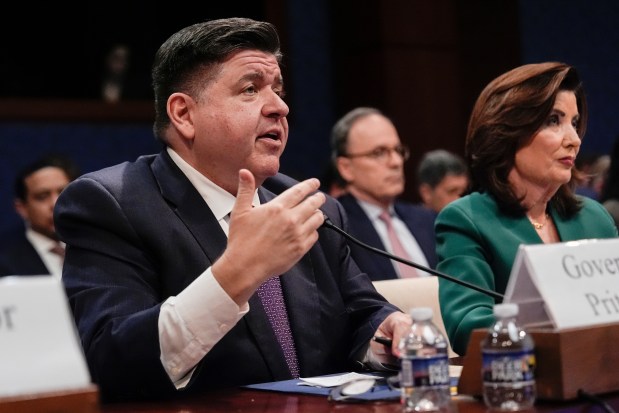After an extended 18-day holiday break from testimony, the jury in the corruption trial of former House Speaker Michael Madigan will be back to work Monday to hear more defense witnesses in a case inching to the finish line.
Before the panel was sent home for the holidays on Dec. 19, the trial’s spotlight had finally turned to Madigan’s defense team, whose witnesses so far have offered a far different picture of the powerful Democratic speaker than the image of a conniving and opportunistic political machine boss painted by prosecutors.
Among them is David Ellis, the Illinois appellate court justice and former top counsel to Madigan, who testified just before the break that the speaker used his political power to stand up for labor interests and blue-collar families and rein in greedy companies such as utility giant Commonwealth Edison.
Prosecutors allege ComEd officials participated in a long bribery scheme to win Madigan’s influence by funneling no-work consulting jobs to his cronies, hiring a law firm run by Madigan’s ally, and putting Madigan’s choice on the utility’s board of directors.
Ellis, however, said that during his time in the speaker’s office, he was instructed by Madigan to hold ComEd’s feet to the fire, insisting on job creation for Illinois residents, rate caps and a sunset provision that would ensure the company had to come back to the General Assembly and show it had kept its word.
“They didn’t like anything I was doing,” Ellis testified. “I wouldn’t have expected them to.”
The trial broke in the middle of Ellis’ direct examination, however it was unclear if he would retake the stand when the jury returns on Monday morning, or if other witnesses will be called out of order due to scheduling concerns.
Another witness Madigan’s defense team has said they intend to call is the accountant for star prosecution witness Daniel Solis, the former 14th Ward alderman who made secret recordings of Madigan during his turn as an FBI mole but was also accused in cross examination of cheating on his taxes during his cooperation.
Madigan’s lawyer also said they want to call a former IRS official to offer analysis of Solis’ alleged tax malfeasance.
Both sides have told U.S. District Judge John Robert Blakey that there are likely two to three more days worth of witnesses in Madigan’s defense case, followed by what likely will be a short prosecution rebuttal. The case would then proceed to the final phase of closing arguments and jury deliberations.
But the trial, which has run longer than expected, is about to encounter another unforeseen delay as the Dirksen U.S. Courthouse will be closed Thursday as part of a national day of mourning for President Jimmy Carter, who died Dec. 29.
That means closing arguments in the case will likely not occur until next week at the earliest.
Madigan, 82, a Southwest Side Democrat, and his longtime confidant, Michael McClain, 77, of downstate Quincy, are charged in a 23-count indictment alleging Madigan’s vaunted state and political operations were run like a criminal enterprise to amass and increase his power and enrich himself and his associates.
In addition to bribery schemes involving ComEd and AT&T Illinois, the indictment alleges Madigan pressured developers to hire the speaker’s law firm and tried to win business by secretly supporting legislation to transfer state-owned land in Chinatown to the city so developers could build a condo tower.
Both Madigan and McClain have denied wrongdoing.
Meanwhile, before the case can go to closing arguments, there will be more work to do among the parties on the all-important jury instructions, which have taken on even more significance in the wake of a U.S. Supreme Court ruling last year that recast a federal bribery statute central to the Madigan indictment.
In a five-hour conference last week, attorneys for both sides argued over a number of nitty-gritty legal elements, including how to define the word “corruptly” in the instructions given to the jury, which will be a key factor jurors have to weigh in determining Madigan’s intent.
The judge held off making any final rulings on the issue, giving the attorneys a chance to confer among themselves and make alternate proposals.
jmeisner@chicagotribune.com



